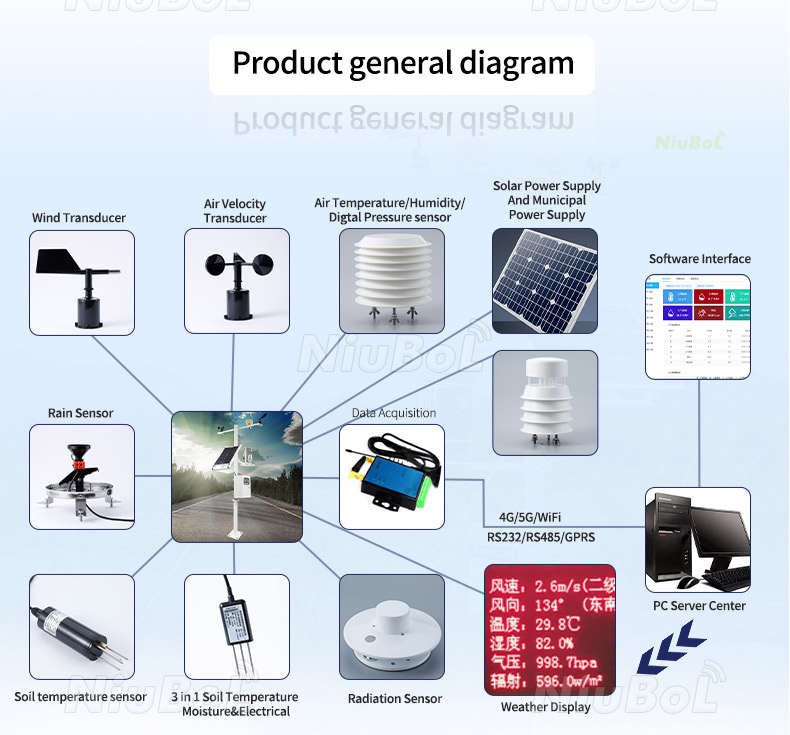

— Blogs —
—Products—
 Consumer hotline +8618073152920
Consumer hotline +8618073152920 WhatsApp:+8615367865107
Address:Room 102, District D, Houhu Industrial Park, Yuelu District, Changsha City, Hunan Province, China
Product knowledge
Time:2024-01-20 20:01:43 Popularity:656
A weather station is a facility for collecting, recording and analysing weather data. It usually includes multiple instruments and sensors for measuring various meteorological elements such as temperature, humidity, barometric pressure, precipitation, wind speed and direction. These data are important for predicting weather changes, understanding climate patterns, and conducting climate research and applications.
Meteorological stations play a crucial role in environmental monitoring, which is mainly reflected in the following aspects:
Provision of real-time monitoring data: meteorological stations monitor meteorological and pollution parameters in the environment in real time through various sensors, such as temperature, humidity, wind speed, wind direction, air pressure, visibility, pollutant concentrations, etc. These data can help scientists and researchers understand the current environmental conditions.
Assessing air quality: By monitoring the concentration of pollutants in the air, meteorological stations can assess the state of air quality and predict its impact on humans and the environment. This is important for preventing diseases of the respiratory and circulatory systems.
Detecting sources and pathways of pollution: Through continuous monitoring of air pollutants, meteorological stations can identify the sources of pollutants and understand their diffusion and migration pathways, which helps to formulate effective pollution control measures.
Prediction and early warning: Based on real-time monitoring and analysis of meteorological and pollution data, meteorological stations can predict future weather and air quality conditions, thus issuing early warnings to remind the public to take necessary protective measures.

Environmental science research: The data provided by meteorological stations are the basis for environmental science research. Scientists can use these data to study climate change, pollutant dispersion patterns, ecosystem response, etc., providing a scientific basis for the formulation of environmental protection policies and measures.
Ecological protection: By monitoring the conditions of biological communities, water resources and soil, meteorological stations can provide information on the health of ecosystems. This helps to identify potential environmental problems and take timely protective measures.
Responding to emergencies: When responding to environmental emergencies, such as chemical spills and fires, the data provided by meteorological stations are crucial to emergency response and rescue efforts.
Raising Public Awareness: By making public the data and results monitored by meteorological stations, public awareness of environmental issues can be raised, and environmental protection actions and public participation can be promoted.
Climate change research: Data collected by meteorological stations over a long period of time are invaluable for studying trends and patterns of climate change. These data can help scientists understand the changes in the Earth's climate system and thus predict future climate conditions.
Agriculture and ecosystem management: Meteorological and environmental data from weather stations are crucial for agricultural production and ecosystem management. For example, farmers can adjust crop planting times, irrigation levels and fertilisation strategies based on meteorological data; ecologists can use these data to assess and manage ecosystem health.
In short, meteorological stations play a key role in environmental monitoring and provide important support for environmental protection, health protection and sustainable social development. With the development of science and technology and the increase in monitoring needs, the functions and roles of meteorological stations will be further strengthened and expanded.
Prev:Forest fire prevention weather station
Next:What are the application scenarios for visibility sensors?
Related recommendations
Sensors & Weather Stations Catalog
Agriculture Sensors and Weather Stations Catalog-NiuBoL.pdf
Weather Stations Catalog-NiuBoL.pdf
Related products
 Combined air temperature and relative humidity sensor
Combined air temperature and relative humidity sensor Soil Moisture Temperature sensor for irrigation
Soil Moisture Temperature sensor for irrigation Soil pH sensor RS485 soil Testing instrument soil ph meter for agriculture
Soil pH sensor RS485 soil Testing instrument soil ph meter for agriculture Wind Speed sensor Output Modbus/RS485/Analog/0-5V/4-20mA
Wind Speed sensor Output Modbus/RS485/Analog/0-5V/4-20mA Tipping bucket rain gauge for weather monitoring auto rainfall sensor RS485/Outdoor/stainless steel
Tipping bucket rain gauge for weather monitoring auto rainfall sensor RS485/Outdoor/stainless steel Pyranometer Solar Radiation Sensor 4-20mA/RS485
Pyranometer Solar Radiation Sensor 4-20mA/RS485
Screenshot, WhatsApp to identify the QR code
WhatsApp number:+8615367865107
(Click on WhatsApp to copy and add friends)